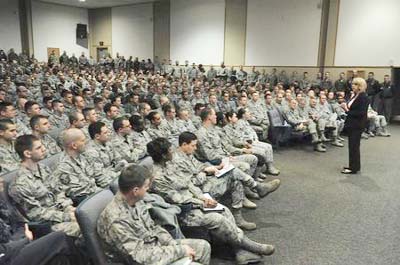
Reuters, Simi Valley :
Russia’s increasing military activities around the world have unsettled top U.S. military officials, who say they are reshaping their budget plans to better address what they now consider to be the most pressing threat to U.S. security.
“Russia is the No. 1 threat to the United States. We have a number of threats that we’re dealing with, but Russia could be, because of the nuclear aspect, an existential threat to the United States,” Air Force Secretary Deborah James told Reuters in an interview at the annual Reagan National Defense Forum. James, Chief of Naval Operations Admiral John Richardson and Pentagon chief arms buyer Frank Kendall, all voiced growing concern about Russia’s increasingly aggressive behavior in interviews late on Saturday.
Their comments come as the Pentagon finalizes a classified security assessment for President-elect Donald Trump, who has promised to both pump up U.S. defense spending and build closer ties to Russian President Vladimir Putin.
European diplomats fear Moscow could use the time before Trump’s inauguration to launch more offensives in Ukraine and Syria, betting that President Barack Obama will be loathe to response forcefully so soon before he hands off power on Jan. 20.
Kendall said U.S. policy had been centered on threats in the Asia-Pacific region and Middle East, but was now focused more on Russia. “Their behavior has caused us … to rethink the balance of capabilities that we’re going to need,” he said. None of the officials gave details about how the concerns would affect the fiscal 2018 budget request, but defense officials have pointed to the need to focus on areas such as cyber security, space, nuclear capabilities and missile defense, where Russia has developed new capabilities in recent years.
Pentagon officials have nearly completed work on a fiscal 2018 budget request, but it is likely to be reworked substantially once Trump takes office. Officials expect that budget to be submitted in April at the earliest, and possibly later. Typically, budgets are submitted in early February.
Marine Corps General Joseph Dunford, chairman of the Joint Chiefs, told the conference that Russia’s goal was to counter NATO, undermine its credibility and limit the ability of the U.S. military to project power around the world.
“They are operating with a frequency and in places that we haven’t seen for decades,” he said, adding that the buildup should be viewed in the context of its actions in Ukraine, Crimea and Syria, where they have already stepped up air attacks on eastern Aleppo.
Russia’s increasing military activities around the world have unsettled top U.S. military officials, who say they are reshaping their budget plans to better address what they now consider to be the most pressing threat to U.S. security.
“Russia is the No. 1 threat to the United States. We have a number of threats that we’re dealing with, but Russia could be, because of the nuclear aspect, an existential threat to the United States,” Air Force Secretary Deborah James told Reuters in an interview at the annual Reagan National Defense Forum. James, Chief of Naval Operations Admiral John Richardson and Pentagon chief arms buyer Frank Kendall, all voiced growing concern about Russia’s increasingly aggressive behavior in interviews late on Saturday.
Their comments come as the Pentagon finalizes a classified security assessment for President-elect Donald Trump, who has promised to both pump up U.S. defense spending and build closer ties to Russian President Vladimir Putin.
European diplomats fear Moscow could use the time before Trump’s inauguration to launch more offensives in Ukraine and Syria, betting that President Barack Obama will be loathe to response forcefully so soon before he hands off power on Jan. 20.
Kendall said U.S. policy had been centered on threats in the Asia-Pacific region and Middle East, but was now focused more on Russia. “Their behavior has caused us … to rethink the balance of capabilities that we’re going to need,” he said. None of the officials gave details about how the concerns would affect the fiscal 2018 budget request, but defense officials have pointed to the need to focus on areas such as cyber security, space, nuclear capabilities and missile defense, where Russia has developed new capabilities in recent years.
Pentagon officials have nearly completed work on a fiscal 2018 budget request, but it is likely to be reworked substantially once Trump takes office. Officials expect that budget to be submitted in April at the earliest, and possibly later. Typically, budgets are submitted in early February.
Marine Corps General Joseph Dunford, chairman of the Joint Chiefs, told the conference that Russia’s goal was to counter NATO, undermine its credibility and limit the ability of the U.S. military to project power around the world.
“They are operating with a frequency and in places that we haven’t seen for decades,” he said, adding that the buildup should be viewed in the context of its actions in Ukraine, Crimea and Syria, where they have already stepped up air attacks on eastern Aleppo.

